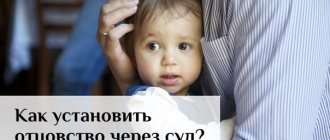The decision to accept a child into a family is quite difficult, because it is necessary to have certain qualities and boundless love and care. Even after making such a decision, potential mothers and fathers face difficulties. On the agenda is the question of what a child should be like: a boy or a girl, age, even appearance plays a role. This stage is the most difficult for future parents, and, as a rule, resolving this issue takes a lot of time.
In fact, most adoptive parents or guardians want to take under their wing a child with a pleasant appearance, of a young age; the state of health plays a huge role - the child must be healthy. Few guardians are ready to take responsibility and adopt a child with disabilities, defects in appearance, or a child with serious illnesses. As a result, adoptive parents are faced with some problems; such “ideal” ideas have to be abandoned and faced with harsh reality.
In order to accept a healthy child, you still need to find him - spend a lot of time and nerves visiting the appropriate institutions. According to the data, among the “refuseniks” there are actually very few children with impeccable health, there are many reasons for this, but this is a separate conversation.
Psychologists do not advise setting strict criteria for yourself when choosing a child - it must be a girl, blonde hair and impeccable health - no. There are many cases when parents with worked out criteria, after visiting a child care facility and communicating with the kids, abandoned the original plan and adopted a completely different child. There is also a violation of plans for the adoption of a number of children. Sometimes, adoptive parents, having learned that their baby has a brother or sister, decide to accept a second child into the family.
Gender and age of the child for adoption or guardianship
When choosing a gender, it is worth remembering that finding a boy is a little easier than finding a girl in the state guardianship authorities, there are no exact explanations for this, it’s just how it happened historically. It is worth remembering that children develop more slowly in the system, and therefore there is no need to set clear age limits. It is likely that a four year old will look like a three year old. It is best to keep in mind the age of the baby, but do not refuse to meet older or younger children.
If it was decided to take a preschooler into the family, then he needs time to adapt. If you take a six-year-old child in August and send him to school in September, problems will arise, both for the parents and for the child himself. Therefore, it is necessary to take time into account and give the child the opportunity to adapt. Ideally, you need to leave the child at home for a year, and let the guardians not be afraid that the child will go to first grade a year later, this is much easier than an unadapted child in the family, and even at school it is necessary to adapt.
Adoption through the eyes of a mother-psychologist: how to find your child?
Adoption of children is gradually ceasing to be a taboo topic, and more and more people are choosing this path for themselves. How to find “your” child? What is the most difficult thing in the current adoption procedure and what parents may encounter once they have already taken the baby home? We talked about this with a young mother and a professional psychologist. Meet Elizaveta Blinova and her son German. Hera spent the first year of his life in the Children's Home, and soon he has been living in a family for a year - with his mother, grandparents.
— Lisa, how did your family, loved ones, and friends react to the decision to adopt a child?
“Parents were wary of this news at first. Dad and Mom were afraid that I wouldn’t be able to cope alone; they believed that I needed to have a strong man’s shoulder nearby to lean on. They tried to reason with me... But gradually they got used to this idea.
I have two younger brothers, each with their own family and children. The brothers told me: “Liza, this is your life, you decide. We are nearby, if anything happens, always call.” And the staff at the kindergarten where I work as a psychologist fully supported me (they often told me: “Go ahead, have your own children, you’ll be a good mother.”)
I really have the most reverent feelings for children. I always wanted children. But somehow events did not reach the point where all this happened in the usual way - husband, family, child. I am not inclined to “do as people do” simply because it is customary, contrary to my inner feelings. And gradually I came to the realization that it was possible to take a different path. Everything in this life is not set in stone - you can always enter from another entrance.
Sweet life at home
I found my Gerochka. I went to see him, showed the photographs to my parents, then took my mother to the orphanage and introduced him... My father and mother began to accept this fact: there is a specific child, and this child will live with us.
And then our boy came to us. Grandma immediately melted. Grandfather resisted a little, then also gave in. In general, my parents got involved in this matter. Our boy is extraordinary. Just a fantastically cool guy.
— Was he always Herman?
- Yes, with this name he was waiting for me in the Children's Home. At first I thought that I would have to change it to something more in tune with me, and then I read the meaning... The meaning of the name is amazing - it is translated from Latin as native, half-blooded. Well, how can I change this?! Then it already belongs to the person, given to him by fate. And he remained Herman. When they showed him to me in care, I thought: what a name! Now I am very glad that he is Herman, he fits this name very well, and you can come up with so many affectionate derivatives from him...
And then Gerchik, a wonderful baby, appeared with us, and then some inexplicable things began to happen to my mother, that is, to me... The child is cute, without health problems, orderly, obedient - well, just perfect. And suddenly I just begin to physically resist the fact that sometimes he doesn’t behave the way I want!
For example, he is stubborn... In kindergarten, my children in my care were stubborn - and everything was clear to me, the children were like open books in front of me. And here I have my own child - and I feel like I have no hands, I don’t know what to do, I don’t understand myself, at some moments it’s hard for me to control myself. It seemed to me that with mine it would be even easier, but it turns out to be more difficult. I know so much, I have so many courses behind me, so much experience - and all this is useless. And I behave...
- ...like an ordinary mother who recently had a child.
- Yes. Only the adaptation of mother and newborn to each other takes a month, two, three. And this adaptation - ours with Hero - is not over yet, although he has been living with us for more than six months. That's why I'm working very hard on myself now.
A child’s soul is so delicate... A child, being in an orphanage, is in a state of severe deprivation - that is, his basic needs (for safety, for love, for acceptance, recognition, approval) are not satisfied. You can't want what you can't. There is no freedom to make decisions. Here everything is decided in advance: when to eat, when to sleep, when to play. And most of all, these children lack warmth from communication and physical contact. Here they have a complete gap. As a result, such children, when they come to the family, are afraid of the touch of their mother’s hands; they are not ready to receive warmth and affection, because they do not know how to accept it.
And if you immediately start abruptly demonstrating to the child that here she is a mother, here - hugging, kissing - this will be another trauma for him. Gentleness, gradualism, tact and accuracy are required in establishing contact with a new family member! And we, parents, alas, do not always have enough sensitivity and patience to be careful. Herman just recently began, of his own free will, to give me his hand on the street. And so he walked on his own, he could run 2-3 meters ahead - he has no connection, no instinct that his mother is here. This connection must be created, nurtured and protected!
- Then it turns out that many natural children do not have this connection with their mothers?
- I agree. But I'm a maximalist. I want what's best. I understand how important this is: so that we learn to feel each other at a distance not only of two meters, but also when the mother goes to work, or the son goes to kindergarten or school. So that he feels that he is needed, that he is mine, that he is not alone. That he will always be with his mother now. After all, he has a huge, total feeling of loneliness. In the Children's Home, everyone is on their own; the most important thing that arises in a family between a child and an adult - healthy attachment - cannot arise there.
I am very glad that, in preparation for adoption, I went to the School of Adoptive Parents. We were given a lot of useful information - but just a few minutes per lesson were devoted to attachment as such. And this is a vital connection. It develops in children, who then enter adulthood, self-sufficiency and self-confidence. They can create strong, reliable families, they are independent, they are successful - because they had a mother in their lives. Because she gave them warmth, care, tenderness, love.
But you have to be able to feel this love. This is the most important thing now for me and for Herman - the creation of our family. Yes, legally we are already a family. But emotionally, we just go to each other. He is an extraordinary guy, I love him madly, but my own love is not enough, this love needs to go beyond me, so that he plunges into it. Feeling yourself is not enough - I want Hera to feel it too. And then I will feel his love for me. And here the second miracle will happen - we will have a real family.
— Was the everyday side of life with a small child easier?
— There were no difficulties with this at all. He's such a cool guy. He sleeps by the hour, eats very well, practically goes to the potty (he doesn’t ask yet, but knows at what moments he will be seated), washes his hands, understands what garbage is. In general, the guy is understanding. He's already doing so much!
In the first month of his life at home, he achieved all normal indicators. We took him in in August, and a month and a half later we went for an examination with a neurologist. So and so, the child is adopted, tell me, how is our development? And in the Children's Home they gave me a decent statement with recommendations - medications, massages, etc. The neurologist looked at Gerochka and said: “Nothing is needed, everything is fine with him.”
He learned to walk a little later than a year, when he was already at home. Now, at less than two years old, he speaks in syllables and sings (he was generally silent in the Children's Home). He finds out what something is called and tries to reproduce it; he already has his own words.
— With the advent of Herman, did you have to leave your job? How do you plan to cope in the future?
— I took maternity leave until German was one and a half years old; it ended 3 months ago. All this time I received 40% of my official salary. Plus there are some financial savings - for now I can afford not to work.
As for money, I am not a very demanding person in this sense. The child is not limited in anything, you don’t have to save at all on him, and on yourself, in general, too. We are absolutely not in poverty, we have everything. I also know for sure that money is not the main thing. As we develop new needs, opportunities will also appear. We will be able to afford everything that he will be interested in and passionate about. I think that everything will be revealed to us, as it was revealed before. But I don’t plan to drive the latest BMW and vacation at elite resorts. He and I will somehow be happy without this.
In the summer, Herman will be two years old, and until that time I will definitely sit with him. Now it is important for him to have his mother nearby. For now, I even try to leave the house only when he is sleeping during the day. From now on I will act based on what happens to him. Starting in September, maybe I’ll go back to the garden part-time, they’re waiting for me there. In general, I am preparing him and myself for the fact that at 3 years old he will go to kindergarten. But by this moment he should already know for sure that he has a mother. Not only to know, but also to feel!
— Was it difficult to go through the adoption procedure?
“Probably someone else in my place would say that there were difficulties everywhere.” I had some minor difficulties that were interesting to me. The clinic suddenly stood up and said that they would not issue a medical certificate, that now this was done centrally. By that time, I had already gone through all the specialists; I only needed the signature of the head physician. I was already desperate, I thought that everything was in vain: spend another two weeks going through the same specialists in another place, the child is waiting, I need to submit documents to the court... I just said: “Please do it. I will not go to another institution. Please don’t ruin my life!” They didn't break it.
Another point: our court usually takes vacations in the summer. Therefore, having met Herman in April, we filed an application with the court in June and only took him home at the end of August. It's just that we do all this... not very quickly. Although I’ll be honest: everywhere I went to get some documents, they gave me what I needed and did it with a smile. Yes, our system is bureaucratic, but people work everywhere, and no one deliberately put a spoke in my wheels.
I sincerely say thank you to every employee who communicated with me: all the doctors, all the care specialists. I visited many wards before the one in which I found Gera - wonderful people everywhere.
— Were there any obstacles due to the fact that the child was adopted by one mother?
- Well, legally it is possible. The only question I was asked on this topic was in the Children's Home, where I found Hera. They were interested in my attitude towards raising a child alone. Why alone, can I? Neither in any guardianship, nor in other Children's Homes did they ask me these questions. And then, apparently, they felt that I would take him away.
Now I sometimes go there - I enjoy communicating with these people. I feel that they treat me with respect. They don’t have a biased attitude: one took the child...
With grandparents
In turn, I very sincerely respect these people, because... such a guy was given to me! I am grateful to these people who raised him for a year. The man was saved for his mother... Now all that remains is to reach him, to reach his heart.
And I am ready to bow at the feet of the guardian who showed me my boy: such a wonderful thing - and give it to me alone. They took it and gave it. Or they might not have shown his profile.
— Was the search long? I had to bypass a lot of guardians because...
- Because I wanted to find my boy. I watched many children. Hera was not the first person I met. I went to Tver, to Orekhovo-Zuevo, there were also several guardianships in Moscow...
All the kids are wonderful. And if parents want to take their child, let them go, they are very welcome there. Everywhere I was, there were children everywhere. There's enough for everyone who wants it. I believe that they will all find their parents.
- What does it mean to find your child?
— When I went to the School of Adoptive Parents, everyone who taught there (and most of them are adoptive parents themselves) said: don’t worry, you will take your person, your baby, your boy, your girl. You will feel it with your heart. And I thought: of course, I will feel it.
While I was still going to this school, I was already looking at all sorts of websites, looking for children - now a lot of things are posted. But, as a rule, the one you like has definitely already been liked by someone before you. And when you call about this child, you find out that either he has already been taken away, or they are getting acquainted with him, etc.
With grandfather and sisters
And even before receiving the conclusion from guardianship, it seemed to me that I had found my boy. I already talked to him at night, called him “my son,” cried when I watched his video passport... Having received the guardianship conclusion, I immediately called the Children’s Home: I want to come to you. “You know, they are already getting acquainted with him, they will register him as a family,” they answered me on the phone.
How so? That was my boy! He was waiting for me! And now they're taking him away? Everything we were told is not true, you can even lose your child... It’s a nightmare, life is unfair. I didn’t open any websites for two months. But then I pulled myself together: the conclusion of guardianship is really only for a year, you can moan for a long time, but then you will again be beating the doorsteps, collecting documents...
One of the doctors told me that a woman came and took the baby in her arms: “That’s it, I won’t give it away, it’s mine. I immediately felt that it was mine.” I thought: I want this too - to see and understand that this is mine. But “mine” appeared only when he crawled across my floor in the apartment. And before that, for 4 months, while German and I were communicating in the Children's Home, I constantly asked myself the question: are you sure that this is yours? And often, when I saw him, I thought: a very good boy, handsome, wonderful - but what am I going to do with you?
Finding your child is destiny. Someone told me from above that I should still go to court and take the child home. And I am grateful to fate and grateful to this feeling from above. Now I have absolutely no doubt that everything was done correctly.
Child status
There are two types of status for a child in orphanages. Some kids can be taken under any form of guardianship - adoption, foster care, guardianship, etc., while other kids can only be taken under guardianship. If you decide to immediately adopt a child, you need to look for a child with full status.
But there is another side to the coin; there are situations when the child practically has a status, but for its realization it is necessary to wait some time. In fact, this is far from a bad situation, because it is possible to take the child under guardianship “to get used to each other,” and only then adopt.
A child may not have full status for several reasons, for example, the child’s parents are in prison, in which case deprivation of parental rights is not possible. The child’s parents may be given a restriction of rights based on “behavior”; such a restriction is imposed for six months, and after this time the issue of either depriving them of their rights completely or returning the child to the family is decided.
Status may also be absent due to mental disorders in the child’s parents. It is possible to completely deprive such parents of parental rights only if their incapacity is recognized and a guardian is appointed. But, on the other hand, such parents will not be able to take the child. The calmest option is considered to be the absence of the necessary time - six months, which must pass after the parents are deprived of their rights. This option does not require any additional procedures.
Health status of the child for adoption or guardianship
Taking into account the lifestyle of parents who left their babies, it is not very correct to look for a baby with a complete absence of diagnoses - this is at the level of fantasy. There are practically no healthy babies; most often you can find babies without serious pathologies.
Before you start searching for a child, you need to decide what diagnoses are preventing your child from being accepted into a family. The most common fears are HIV, hepatitis, Down syndrome, cerebral palsy, mental retardation, autism, etc. But it is necessary to study at least a little about a serious diagnosis and understand the differences in medical terms. Usually, when parents see the abbreviation HIV, they immediately refuse, and it doesn’t matter in what context the diagnosis is. “HIV” and “HIV contact” are completely different things.
The same applies to aesthetic disorders of the child’s appearance, for example, ptosis/strabismus, but the child does not look the best, and this pathology is striking. But strabismus can be successfully treated with conservative methods, but ptosis can be treated no less successfully, but still surgically.
The hereditary factor is an important criterion that also needs to be determined. Is it possible to take risks, and is there a willingness to take this risk, if it is known for certain that the disease occurs in 25–30% of cases. It is especially difficult to make a choice if there is a heredity that relates to psychiatric diseases. Doctors say that it is possible to talk about heredity in psychiatry if it is known that other relatives also have the diagnosis. If we are talking about an acquired psychiatric diagnosis - alcoholic psychosis, this disease is not inherited.
It is worth remembering that the confirmed alcohol or drug addiction of biological parents significantly affects the physical health and intelligence of the child. Most often this is expressed in increased excitability of the child, and such children are diagnosed with hyperactivity syndrome. If the adoptive family is accustomed to silence and a measured lifestyle, then you should think carefully, because the baby will be very active, athletic and inquisitive, sometimes even too much.
It is the assessment of the child’s health status that should take the leading place, because it is necessary to soberly and sensibly assess whether it will be possible to carry out adequate treatment and rehabilitation of the child.
Child's relatives
It is necessary to immediately discuss the attitude towards the child’s blood relatives, most often these are grandmothers, aunts, etc. if the child is immediately adopted, then this issue does not need to be discussed, since there is a secret of adoption, the relatives simply will not know which family he is in child.
But if the child is under guardianship or in a foster family, then relatives have the right to communicate. As practice shows, most often this remains at the level of desire, or it can be phone calls to make sure that everything is okay with the child.
If communication with the child’s relatives causes harm to the child, then guardians or adoptive parents have the right to limit this communication by obtaining the opinion of a psychologist and writing an appropriate statement.
Other materials on the topic
- "Opora" - a club for foster parents
- The beginning of the school year: how to survive and what parents should not forget. Advice from psychologist Lyudmila Petranovskaya
- Why do we need a school for foster parents?
- First meeting with a child. Part 1 – How to organize a meeting with a small child in an orphanage
- What are former pupils entitled to?
- First meeting with a child. Part 1 – How to organize a meeting with a small child in an orphanage
- Meetings at Besedka
- What do adopted children inspire parents to do?
Appearance of a child for adoption or guardianship
This question will be relevant only after 2 years, newborn babies can change dramatically by the age of one year, turning from blond to brunette or vice versa. Only the eye color remains unchanged after six months of a child’s life. If it has been decided to maintain a conditional secret, and the adoptive parents are afraid of the questions: “Who is your baby like?”, then it is worth remembering that genetics is a mysterious “thing.” With a clear conscience we can say that the child looks like his grandfather, grandmother, etc. Even children from mixed-race parents can have a completely Slavic appearance and vice versa.
Changes in documents only at the request of the adoptive parent
The fact is that when submitting documents for adoption, adoptive parents do not always immediately raise the question of making changes to the data about the parents of the child they are adopting in the birth registration book at the registry office, and such changes by the registry office employees can only be made by a court decision. Moreover, the court cannot make such a decision on its own - it can give instructions to make appropriate changes in the birth registration book in the registry office only at the request of the adoptive parents.
If there was no such petition, the civil registry office staff, after providing them with a court decision on the adoption of a child, will make an addition to the data of the “former parents” (last name/first name/patronymic and citizenship) in the birth registration book (similar data of the adoptive parents), and “new parents” Only an adoption certificate will be issued, which will indicate both the “former” and “new” parents of the child.
The criteria are clear
After realizing and understanding what kind of child the family wants to adopt - gender, age, external qualities. It is necessary to start searching for the baby. First of all, the guardianship authorities will offer to get to know the children who are in the guardianship area. But if there are no suitable children in the area of residence, or there are simply no child care facilities, then in the future you need to start searching on your own. And here, there is a direct proportionality: the more effort and time spent searching for the baby, the more successful the result will be.
You should not start with telephone calls to the guardianship authorities; the ideal and correct option is to collect all documents and opinions. And as soon as they appear in the guardianship authorities, you can storm the telephone lines.
If a family wants to accept a newborn baby into their family, then there is no point in calling the guardianship authorities. Information about such children arrives three months later, or even later, after refusal - that’s the system. The ideal and correct option is to obtain information about which medical institution the refuseniks are admitted to. Visit all wards on whose territory there are hospitals with incoming refuseniks and register everywhere. Some regions do not release babies from hospitals, but wait until they are transferred to orphanages, and in such institutions it is also necessary to register.
If it was decided to adopt a non-newborn baby, then immediately after receiving the conclusion, you must make an appointment with the regional guardianship authorities. Upon arrival on the reception day, you must provide all documents and a statement of desire to familiarize yourself with the profiles of the children assigned to the territory of guardianship. If there are babies that potential parents are interested in, you need to get a referral to meet the child.
Adopted child: commentary from a school psychologist
. Mastakova E.I., psychologist of the pro-gymnasium 1733 . I studied in the 4th grade. We lived next to a forest, so we often went there with a friend. One day in the forest we met many children walking. They were dressed ridiculously, many had caked snot on their noses, and some were a little strange, unlike ordinary children. One girl had dark skin, which especially attracted our attention then. We didn’t immediately realize that these were children from the orphanage. We felt very sorry for them. We got closer and tried to get to know some of the kids. They were glad to see us. They began to approach, obsessively trying to cuddle, hold hands, talk, attract attention. A feeling of disgust arose inside, but pity overpowered it. We began to often go to that clearing to meet the guys. They bought them gingerbread and other sweets. The teachers didn't pay much attention to us. They were mostly busy communicating with each other and making sure that the children did not wander off into the forest.
Already when this boy appeared at the door - quite tall, strong; black hair; dark eyes shooting at me with apprehension, but mostly looking at the floor - my spine went cold. As always, I invited him to sit down at the table to play and complete various interesting tasks. His fingers were constantly in motion, like those of a professional sharper, all the time as if stroking and fingering the objects on the table. He didn’t look me in the eyes, but when he occasionally raised his heavy gaze to me, I froze to the chair.
We recommend reading: Tax deduction after purchasing an apartment
Studying questionnaires of children for adoption or guardianship
The questionnaire and the child himself are in the vast majority of cases different. Even a photo of a child may not correspond to reality, sometimes even the diagnoses in the questionnaire do not correspond to the truth, so you should be more careful in your choice and check everything yourself. To make the task easier, you can focus on the child’s health group: group 1 – absolutely healthy, groups 2 – 3, children with mild treatable pathologies, group 4 – the presence of chronic diseases, and children with health group 5 have disabilities. Only the attending physician has accurate information about the child’s health status, and the diagnoses written in the questionnaire are transmitted after the next medical examination, and the human factor should not be excluded.
From all of the above it follows: if you like the child, but there are concerns about his health, then it is best to take a referral and get acquainted with his medical history in detail, on an individual basis, thereby eliminating all possible mistakes.
Conversation with guardianship
Initially, you need to familiarize yourself with the child’s personal file and find out at what age the child entered the institution, who his biological parents are, the results of the latest medical examinations, the presence of possible relatives, etc. Again, you should trust only those personal data that are documented.
After studying the questionnaire, before meeting the baby, the child care facility gives potential parents the opportunity to study the child’s medical record, and they will not hide the baby’s diagnoses from the parents, rather the opposite!
The ideal option is the help of a doctor who will help decipher incomprehensible medical terms, abbreviations, etc. It would not be superfluous to study “typical diagnoses of children in the system.”
A consultation with the pediatrician assigned to the children's institution is necessary; it is necessary to find out what the main diagnosis is, what studies were carried out and what the results are over time. Potential parents have every right to an independent medical examination of the child.
It is worth remembering that children in the system lag behind their peers raised in the family, and this, in most cases, is not a developmental delay, but simply neglect of the child. It’s just that kids don’t have enough parental attention, and there’s no one to try for!








